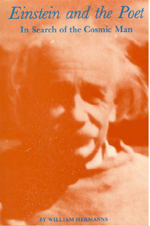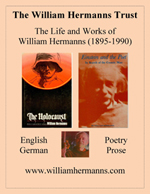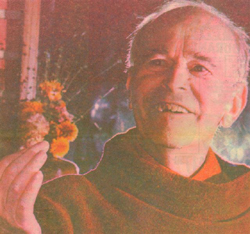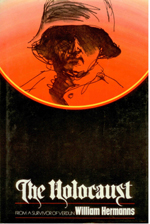
 |
|
|
Click bars for Navigation ---- ---- Published Books by William Hermanns - Click cover image for it's webpage.  ---  Out of print books available - email us Translate page
---
Like our facebook page WilliamHermanns to get website update notices and some uploaded poetry that talks to your soul. --- Please help support this website. We'll continue to upload more gems from the archives. See Contact Page to communicate with us. To My NeighborSeelentränenNavigationContact / Kontakt |
||||
|
|
Einstein's Cosmic ManClick on buttons below to navigate to the page. Klicken Sie auf die Schaltflächen unten, um zur Seite zu navigieren. ---- Einstein's Cosmic Man In His Own Words1930 "Many people think that the progress of the human race is based on experiences of an empirical, critical nature, but I say that true knowledge is to be had only through a philosophy of deduction. For it is intuition that improves the world, not just following the trodden path of thought. Intuition makes us look at unrelated facts and then think about them until they can all be brought under one law. To look for related facts means holding onto what one has instead of searching for new facts. Intuition is the father of new knowledge, while empiricism is nothing but an accumulation of old knowledge. Intuition, not intellect, is the ‘open sesame’ of yourself." -- Albert Einstein, in Einstein and the Poet – In Search of the Cosmic Man by William Hermanns (Branden Press, 1983, p. 16.), conversation March 4, 1930 Excerpt from Religion and Science by Albert Einstein The Jewish scriptures admirably illustrate the
development from the religion of fear to moral religion, a development
continued in the New Testament. The religions of all civilized peoples,
especially the peoples of the Orient, are primarily moral religions. The development from a religion of
fear to a moral religion is a great step in peoples lives. And yet, that
primitive religions are based purely on fear and the religions of
civilized peoples purely on morality is a prejudice against which we must
be on guard. the truth is that all religions are a varying blend of both
types, with this differentiation: that on the higher levels of social life
the religion of morality predominates.
1943 "No matter how idealistic and necessary a group is, each member must first be loyal to his conscience.” Albert Einstein, in Einstein and the Poet – In Search of the Cosmic Man by William Hermanns (Branden Press, 1983, p. 73. – conversation in August 1943) 1948 "One never goes wrong following his feeling. I don’t mean emotions, I mean feeling, for feeling and intuition are one.” Albert Einstein, in Einstein and the Poet – In Search of the Cosmic Man by William Hermanns (Branden Press, 1983, p. 95. – conversation on September 14, 1948) "We must
make the individual man aware of his conscience so that he understands
what it means that only a few will survive the next war. This man will be
the cosmic man." Albert Einstein, in Einstein and the Poet – In Search of
the Cosmic Man by William Hermanns (Branden Press, 1983, p. 99.)
"That is
why the most beautiful Church for me is the church of conscience, found in
the silence of one's own presence. Unselfishness, humaneness, service to
your brother - these are the values which the Church should practice for
once, instead of constantly trying to gather in more souls. A cosmic
religion is the only solution - then there will be no more Church politics
of supporting the mighty at the cost of the human rights of the poor."
Albert Einstein, in Einstein and the Poet – In Search of the Cosmic Man by
William Hermanns (Branden Press, 1983, p. 106.)
1954
“We will be destroyed unless we create a cosmic conscience. And we have to begin to do that on an individual level, with the youth that are the politicians of tomorrow…. But no one, and certainly no state, can take over the responsibility that the individual has to his conscience.” Albert Einstein, in Einstein and the Poet – In Search of the Cosmic Man by William Hermanns (Branden Press, 1983, p. 141. Conversation in Summer of 1954) “Too many religions preach love without justice. As long as there
are no decent conditions for all men, as long as religions do not consider
that their highest obligation is to create decent conditions for all
mankind regardless of what creed, they have degraded love and justice.”
Albert Einstein, in Einstein and the Poet – In Search of the Cosmic Man by
William Hermanns (Branden Press, 1983, p. 142.)
“ We must change the
heart of man.” Albert Einstein, in Einstein and the Poet – In Search of
the Cosmic Man by William Hermanns (Branden Press, 1983, p. 143.)
See also the essay
Change the Heart of
Man.
"Be
proud of being the mean between macrocosm and microcosm. Stand still and
marvel. Try not to become a man of success, but a man of value. Look
around at how people want to get more than he receives. Be creative, but
make sure that what you create is not a curse for mankind.” Albert
Einstein, in Einstein and the Poet – In Search of the Cosmic Man by
William Hermanns (Branden Press, 1983, p. 143.)
“We must create a cosmic
man, a man ruled by his conscience.” Albert Einstein,
in Einstein and the
Poet – In Search of the Cosmic Man by William Hermanns (Branden Press,
1983, p. 133.)
"Create a community which develops the highest of man's
qualities based on conscience. You must warn people not to make their
intellect their god. The intellect knows methods but it seldom knows
values, and they come from feeling. If one doesn't play a part in the
creative whole, he is not worth being called human. He has betrayed his
true purpose." Albert Einstein, in Einstein and the Poet – In Search of
the Cosmic Man by William Hermanns (Branden Press, 1983, p. 135.)
“About
God, I cannot accept any concept based on the authority of the Church. As
long as I can remember, I have resented mass indoctrination. I do not
believe in the fear of life, in the fear of death, in blind faith. I
cannot prove to you that there is no personal God, but if I were to speak
of him, I would be a liar. I do not believe in the God of theology who
rewards good and punishes evil. My God created laws that take care of
that. His universe is not ruled by wishful thinking, but by immutable
laws.” -- Albert Einstein, in Einstein and the Poet – In Search of the
Cosmic Man by William Hermanns (Branden Press, 1983, p. 132.)
|
Please support
our sponsors. Click on image to be directed to their website ~~~~~~~~  ~~~~~~~~  ~~~~~~~~  ~~~~~~~~ Norton & Holtz Business Solutions  ~~~~~~~~  ~~~~~~~~  ~~~~~~~~ Published Books below: Click cover image for it's webpage:  Available at Amazon. For Hardbacks Contact us. ---  Inquire on out of print books ~~~~~~~~ |
|
|
|
|
|
|
||
|
Prose and Plays |
|
Poetry |
|
Events |
|
Website Info |
Website © Copyright 2011-2022 by Kenneth E. Norton Articles by William Hermanns (c) by William Hermanns Trust |
||||||